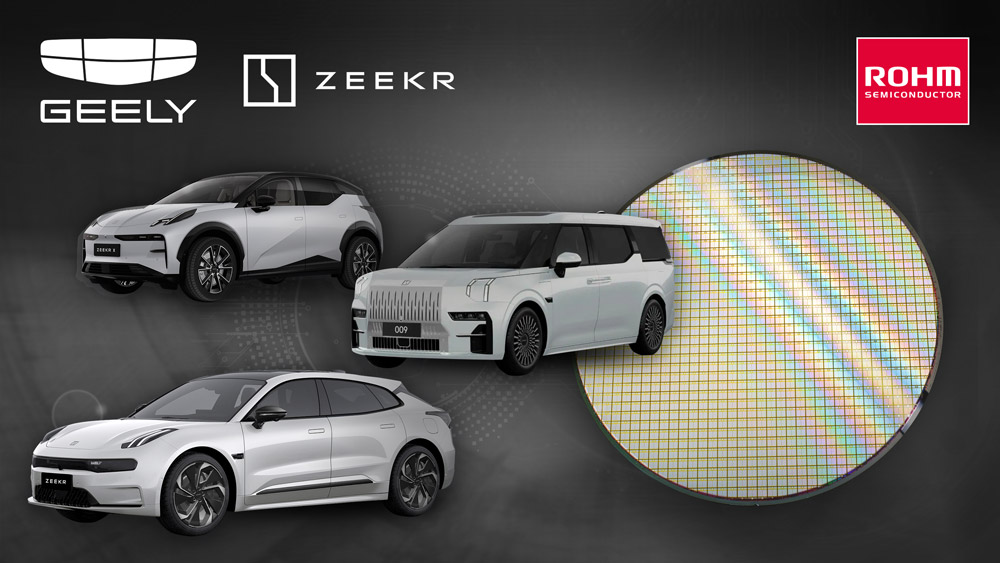According to Rohm Corporation, a Japan manufacturer of power semiconductor devices, power modules equipped with fourth-generation silicon carbide (SiC) MOSFET bare chips have been adopted in traction inverters for three models of the ZEEKR electric vehicle (EV) brand of China's Zhejiang Geely Holding Group. Since 2023, the power modules have been mass-produced and shipped from Haimo Integrated Circuit (Shanghai) Co., Ltd., a joint venture between ROHM and Zhenghai Group Co., Ltd., to Geely's Tier 1 manufacturer Veredi Electric Vehicle Technology (Ningbo) Co., Ltd.
Advantage of SiC MOSFET
High efficiency: SiC MOSFETs have higher efficiency than traditional silicon-based MOSFETs, which means that SiC MOSFETs can reduce energy loss and increase the range of electric vehicles with the same power output.
High temperature resistance: SiC materials are able to operate stably at higher temperatures, which helps improve the reliability and durability of electric vehicles
Fast switching: SiC MOSFETs have faster switching speeds, which helps reduce energy losses during switching and can support higher frequency applications.
Miniaturization: Due to the high efficiency and high-temperature performance of SiC MOSFETs, the size of the cooling system can be reduced without sacrificing performance, thereby contributing to the lightweighting and space optimization of electric vehicles.
Applications for ZEEKR EV
In the three models of the ZEEKR EV, the fourth-generation SiC MOSFET chip with ROHM can be expected to bring the following benefits:
Improved performance: High-efficiency SiC MOSFETs help improve the dynamics of electric vehicles, including acceleration and top speed.
Increased range: SiC MOSFETs help improve the energy efficiency of electric vehicles due to reduced energy loss, thereby increasing range.
Optimized Charging Speed: The fast switching characteristics of SiC MOSFETs help optimize the charging process and may support faster charging speeds.
Improved reliability: The high-temperature characteristics of SiC MOSFETs help improve the reliability of electric vehicles in extreme environments.

Figure: Geely's ZEEKR EV is powered by ROHM's fourth-generation SiC MOSFET chips
Industry trends
With the rapid development of the electric vehicle market, the demand for high-performance semiconductors is also growing. As an advanced semiconductor technology, SiC MOSFETs are gradually becoming a key component of electric vehicle powertrains. The ZEEKR EV uses ROHM's SiC MOSFET chips, reflecting automakers' ongoing quest to improve the performance and efficiency of electric vehicles.
Geely and ROHM have been working together since 2018, initially through technical exchanges, followed by a strategic partnership focused on SiC power devices in 2021. This led to the integration of ROHM's SiC MOSFETs into traction inverters in three vehicle models:
The ZEEKR X, although it is a compact SUV, has a maximum output of more than 300kW and a range of more than 400km;
009 minivan, equipped with an intelligent cockpit and a large 140kWh battery, with a maximum range of up to 822km;
The flagship model, the 001, has a maximum output of more than 400kW and a range of more than 580km with dual motors, and is equipped with a four-wheel independent control system.
In every EV, SiC MOSFET-centric ROHM power solutions are said to play a key role in extending range and improving overall performance.
ROHM plans to launch fifth-generation SiC MOSFETs in 2025 while accelerating the introduction of sixth- and seventh-generation devices to the market.
This move by ZEEKR EV not only demonstrates its innovative capabilities in the field of electric vehicle technology, but also demonstrates the importance that the industry as a whole attaches to high-efficiency, high-performance semiconductor technology. As technology continues to advance, we can expect electric vehicles to deliver better performance and a more environmentally friendly travel experience in the future.






